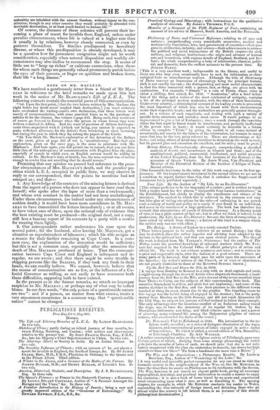NOTE ON MR. MACLEAN.
WE have received a gentlemanly letter from a friend of Mr MAC- LEAN in reference to the brief remarks we made upon him last week in the notice of Mr. BLANCHARD'S Life of L. E. L. The following extracts contain the essential parts of this communication. "1st. Upon the first point, [that the two letters written by Mrs. Maclean the night before her death never reached their destination,] you must certainly have overlooked the waiting-maid's own declaration, that these letters were merely of recommendation, with some practical hints as to the purchase of articles fit for the climate. See volume 1, page 243. Being such, they would not of course go forward to Europe when the person in whose favour they were written remained in Africa. And the want of precision of African habits pre- vents those acquainted with it (which not being, you cannot be expected to snake sufficient allowance for the defect) from wondering at their becoming lost during the year in which they lay among the papers a the Castle.
"2d. You think Mr. Maclean's explanation of the detention of the Baileys on the coast, given at page 245 of vol. 1, unsatisfactory.' But their own explanation, given on the same page, is the same in substance with Mr. Maclean's. And here again, you will permit me to remark, that you can have little idea of the unfrequency of communication with England from the place, especially of vessels in which even an English servant would be willing to embark. In Mr. Maclean's state of health, too, the man-servant was of service enough to render him not unwilling that he should remain."
Premising that any opinion we passed had reference to the pecu- liar circumstances of Mrs. MACLEAN'S death, and the peculiar po- sition which L. E. L. occupied in public fame, we may observe in reply to our correspondent, that the points he mentions had not -escaped us ; and that- 1. Any knowledge of the contents of the missing letters is derived from the report of a person who does not appear to have read them herself; who spoke after the lapse of more than a twelvemonth ; and whose own conduct in the matter had not been unchallenged. Under these circumstances, (as indeed under any circumstances of sudden death,) it would have been more considerate in Mr. MAC- LEAN to have transmitted the letters immediately ; or at all events, to have taken care of them, upon the rational rule of evidence that the best existing must be produced—the original deed, not a copy, still less a hearsay report of its contents by a party with a motive for treating them lightly.
2. Our correspondent rather understates his case upon the second point ; for the husband, after leaving Mr. MACLEAN, got a situation as superintendent of labourers; which his wife assigns as a reason for their further remaining at Cape Coast. In a com- mon case, the explanation of the detention would be sufficient ; but this is not a common case, especially after the sensation the death. of Mrs. MACLEAN produced at home. That the communi- cation between Cape Coast and England is infrequent and ir- regular, we are aware ; and that there might be some trouble in shipping persons like the BAILEYS, if they took any freak in their heads, we can readily believe. We cannot, however, believe that the means of communication are so few, or the influence of a Co- lonial Governor so trifling, as not easily to have overcome both these difficulties, supposing both to have existed. In the present as in the former remarks, we attach no improper suspicion to Mr. MACLEAN ; or perhaps any of what may be called blame. In our first words, "the only points of a questionable nature are two ": and if a person, no matter from what causes, treats a very uncommon occurrence in a common way, that " questionable nature" cannot be changed.


























 Previous page
Previous page